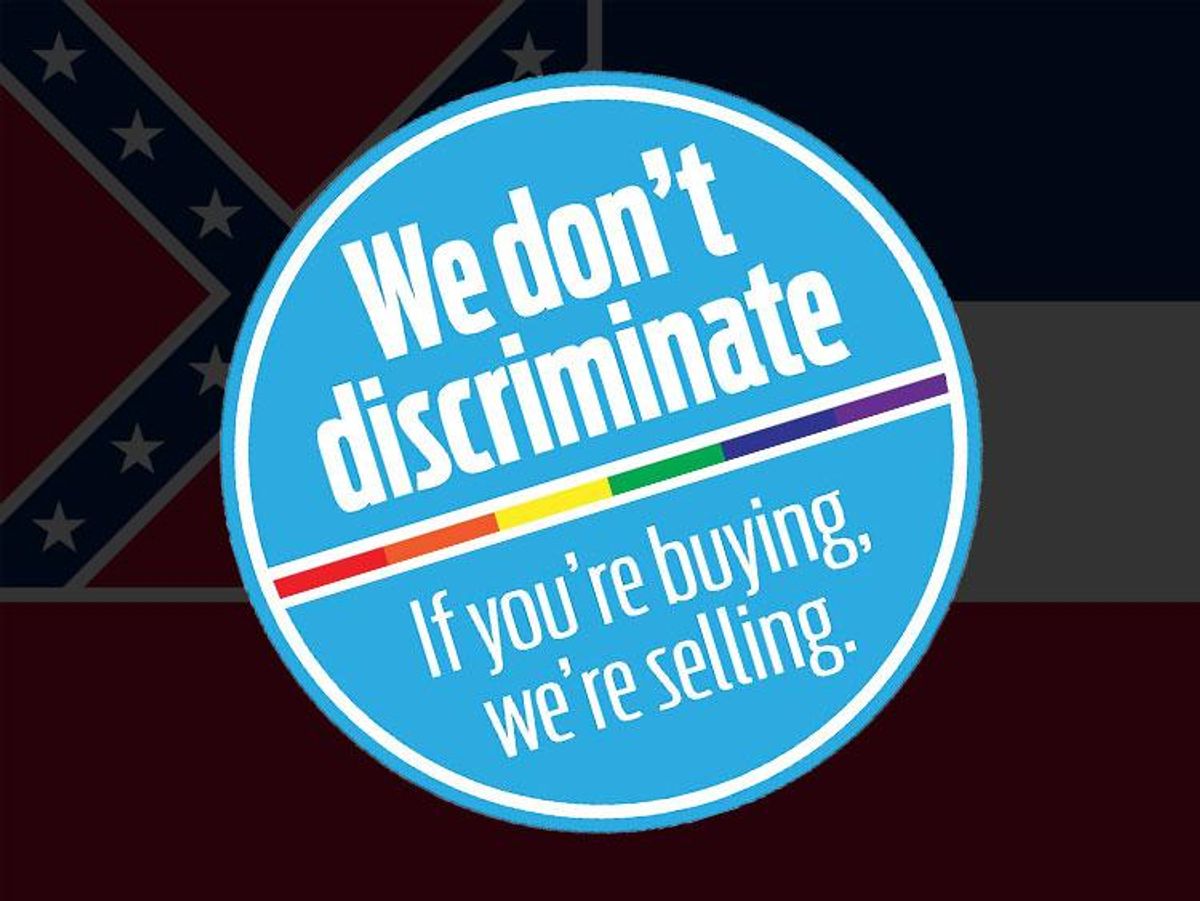With its seasonal parfaits, Indianola pecan pies, and multi-layered cakes as tall as hatboxes, Sugaree's Bakery is well known among the foodies of Mississippi. The proprietress, Mary Jennifer Russell, named the small-batch bakery after a Grateful Dead song and has always run her establishment with a spirit of openness and love. So she was outraged when, last April, Governor Phil Bryant signed a hotly contested and far-reaching piece of anti-LGBT legislation into law.
Before the ink had dried on the bill, Russell had called her contacts in the hospitality business, asking what could be done.
"Our strengths in Mississippi are cultural -- food, art, and music," Russell says. "This is a slap in the face to most of that cultural base."
House Bill 1523, the "Protecting Freedom of Conscience from Government Discrimination Act," is widely recognized as one of the most sweeping anti-LGBT "license to discriminate" bills in the nation. It gives legal protections to shopkeepers, government workers, and anyone else who refuses to provide services to LGBT people and others out of a "sincerely held religious belief."
Mississippi is the poorest state in the nation, and HB 1523 looks like a way to make it poorer. Organizations such as the National College Athletic Association have asserted they will not schedule tournaments or conventions in states with anti-LGBT laws. As a result of the passage of HB 1523, an estimated 10% of the convention business scheduled for the summer months, which Mississippi's coastal areas depend upon to keep the casinos and hotels afloat, has been canceled. A number of cities, including Cincinnati, Philadelphia, San Francisco, and Washington, D.C., have passed bans on nonessential city-funded travel to Mississippi.
Mississippians like Russell are joining together in hopes of reversing the damage to the state's economy and reputation. Mike Cashion, executive director of the Mississippi Hospitality and Restaurant Association, has launched a new public-service campaign titled "Everyone's Welcome Here," telegraphing an industry-wide message of inclusiveness, which includes providing decals declaring acceptance. "This campaign is about more than a sticker on your door," says Cashion. "It's about the values of our industry -- values of hospitality and nondiscrimination. Now we're working with the Mississippi Economic Council," he notes. "So even more folks are signing on."
Other campaigns backed by local LGBT rights groups include the "If You're Buying, We're Selling" drive. It has been embraced by more than 500 businesses in Mississippi, which have affixed welcoming blue stickers to their doors and windows.
Mississippi native Knol Aust, who designed the sticker, said it was encouraging, albeit surreal, to see local businesses featuring his work. "When you travel to places like the Castro, you see rainbow stickers everywhere," he says. "But we'd never had that before. So it was exciting to see this pop up in places I never would have expected -- like hardware or liquor stores, which typically don't get involved in politics."
It didn't take long for fundamentalist organizations to push back. Buddy Smith, a spokesman for the right-wing advocacy organization the American Family Association, which is based in Tupelo, Mississippi, said, "It's not really a buying campaign, but it's a bully campaign, and it's being carried out by radical homosexual activists who intend to trample the freedom of Christians."
Groups like the AFA have an important economic stake in HB 1523. A key purpose of the legislation, according to the AFA itself, is to protect the AFA and groups like it from "the government threat of losing their tax-exempt status."
What's good for the AFA, however, isn't good for the businesses of their fellow Mississippians. Especially concerning to business leaders are the losses of the many personal vacations and family holidays that are hard to tally. "Those don't make the headline news," Cashion says, his frustration palpable. "But people hear about this bill and they cancel a three-night trip where they would have spent hundreds or even thousands of dollars in the state. You aggregate that onto a number of families, and the sum can be significant."
Andrew Dawson and David Mitchell, proprietors of Bazsinsky House, a scenic riverside bed-and-breakfast in Vicksburg, have already noted a drop-off in reservations. In 2006, the pair purchased the circa-1860s pile. After a multi-year rehabilitation, the storied mansion home has been restored to iconic splendor, with period furnishings and landscaped gardens. Attracting visitors from around the world, it plays an important role in the economic ecosystem of this small yet history-rich city. The passage of HB 1523 has not just put a dent in Dawson and Mitchell's business; it has struck a blow to their entire community.
"It's really sad because this legislation does not reflect who we are here in Vicksburg," Dawson says. "We have an incredible mayor and police chief, a terrific newspaper. Last week we had a tourism rally, and our tourism director spoke about how diverse Mississippi is. Our friends are doing everything they can to make everyone feel welcome here."
According to Rob Hill, state director of the Human Rights Campaign, corporations have already received the message that inclusive policies are the only way to attract top talent to the state. While helpful, public-relations campaigns are not enough. "Our focus right now is on repeal," he says. "We're prepared to challenge this legally and have it overturned."
Hill is encouraged by the growing number of political allies in the House and Senate. "Representative Jay Hughes from Oxford, Mississippi, introduced a bill intended to repeal HB 1523," he says. "It died in the rules committee but will be reintroduced. Our hope is that the governor will feel the pressure and be persuaded to call a special session to repeal the bill."
Given the ruby-red complexion of Mississippi's legislature, that seems wishful. But the need for forceful action is undeniable. "LGBT people in Mississippi still lack basic protections in areas like employment, housing, and accommodation," Hill says. "This bill makes us feel so vulnerable. As long as we don't have full equality, we will keep fighting."
Hill points out that a number of city leaders have spoken out against the decision, including the mayors of Jackson and Biloxi. Supportive industry groups include the Mississippi Manufacturers Association, the Mississippi Tourism Association, and the Mississippi Economic Council.
Ironically, Hill notes, HB 1523 could have the unintended consequence of fortifying the movement for equality. "This bill is contributing to a tipping point where people are pushing back vocally. The legislators who pushed this are underestimating its power to generate widespread opposition," he says. "What they don't realize is that Mississippians are changing on this issue, as is the rest of the country. We know this through polling data that we have received; people are getting to know their LGBT neighbors, family members, their friends, the people who sit next to them at work or at church."
In the meantime, Mississippi will continue to burn. Mississippi native Jan Johnson Goldberger, writer-director of an independent, family-friendly feature film, Cupcake & Rocky, is among those in the movie business rethinking plans to shoot in her home state.
"When you enact laws to discriminate, I can't be a part of that because of my own history as an African American," she says. "I'm not going to shoot somewhere where they're actively discriminating against LGBT individuals. My sister is a lesbian, and many of my friends are part of that community. When you enact laws to discriminate against one group of people, you can discriminate against anybody."


















































































